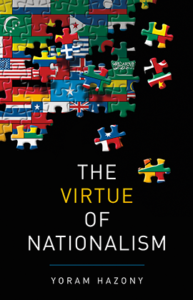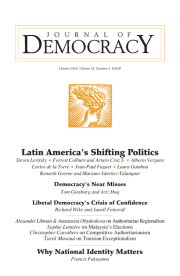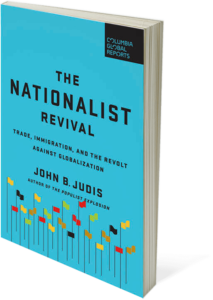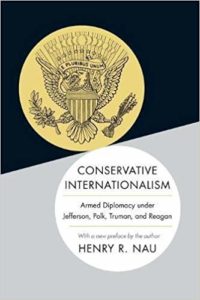 Countries with a benign form of nationalism are less likely to experience democratic breakdown, some analysts suggest.
Countries with a benign form of nationalism are less likely to experience democratic breakdown, some analysts suggest.
True, political leaders have harnessed nationalism to undermine democracy. But that need not always be true. My research shows inclusive nationalism — based on shared ideas or principles rather than race, ethnicity or religion — has helped to create and support vibrant democracies, Oxford University’s Maya Tudor wrote for The Washington Post.
The functioning of democratic institutions depends on shared norms and perspectives and ultimately on a shared culture—all of which can exist on the level of a national state, but do not exist internationally, argues Stanford University’s Francis Fukuyama.
 Contrary to arguments that the concepts of national identity and state sovereignty have become outmoded, an inclusive sense of national identity remains critical to maintaining a successful modern political order, he writes for the Journal of Democracy.* National identity not only enhances physical security, but also inspires good governance; facilitates economic development; fosters trust among citizens; engenders support for strong social safety nets; and ultimately makes possible liberal democracy itself.
Contrary to arguments that the concepts of national identity and state sovereignty have become outmoded, an inclusive sense of national identity remains critical to maintaining a successful modern political order, he writes for the Journal of Democracy.* National identity not only enhances physical security, but also inspires good governance; facilitates economic development; fosters trust among citizens; engenders support for strong social safety nets; and ultimately makes possible liberal democracy itself.
The perception of a common national identity is essential to democracies and to the modern welfare state, which depends on the willingness of citizens to pay taxes to aid fellow citizens whom they may never have set eyes upon, according to John B. Judis, the author of “The Nationalist Revival: Trade, Immigration, and the Revolt Against Globalization.”
 Today’s nationalist revival is in reaction to the failure of global, not nation-based, initiatives that sailed over the heads of ordinary citizens, he writes for The New York Times:
Today’s nationalist revival is in reaction to the failure of global, not nation-based, initiatives that sailed over the heads of ordinary citizens, he writes for The New York Times:
The reaction has been most potent on the political right, but there is certainly a basis for a liberal or social-democratic nationalism. If anything, the decline of liberal and social-democratic parties is a result at least in part of their inability to distinguish what is legitimate and justifiable in nationalism from what is small-minded, bigoted and contrary to the national interest it claims to uphold.
In the 1920s, when nationalism was authoritarian and the balance of power pernicious, nationalism was a destructive force, argues George Washington University professor Henry R. Nau, author of Conservative Internationalism: Armed Diplomacy Under Jefferson, Polk, Truman, and Reagan. When nationalism became liberal and globalism built the democratic peace of the 1990s, nationalism became a more constructive foundation of global politics, he writes for The National Interest:
 Today, all major industrialized nations are democracies. In this kind of world, nationalism is not a destructive force but a democratic check on global elites and institutions. Globalism empowered financial, cultural and bureaucratic elites, and they act to this day largely outside democratic control. Not a single official in the European Union (EU), UN, WTO and IMF is directly elected or accountable to a popular vote.
Today, all major industrialized nations are democracies. In this kind of world, nationalism is not a destructive force but a democratic check on global elites and institutions. Globalism empowered financial, cultural and bureaucratic elites, and they act to this day largely outside democratic control. Not a single official in the European Union (EU), UN, WTO and IMF is directly elected or accountable to a popular vote.
Nationalism, Citizenship, Identity
How are nationalism, citizenship, and identity changing? What types of political movements are rising due to these changes? How will liberal democracy and authoritarianism be impacted? How is identity shaped by elites and by structural conditions? Georgetown University’s Democracy and Governance Program asks.
The program is seeking well-written, interesting submissions of 1,500 – 2,000 words for the 2018-19 edition of its publication — Democracy & Society. The submissions can be new publications, summaries, excerpts of recently completed research, book reviews, and works in progress. Graduate and undergraduate submissions are both accepted. Submissions for this issue will be due by January 4, 2019. Please email all submissions along with a brief author’s bio to democracyandsociety@gmail.com.
This issue will have a focus on Borders, Migration, the Nation and we are seeking articles that address the following themes:
Nationalism, Citizenship, Identity (as above)
Refugees, Immigrants, Statelessness
How do different regime types and governing styles impact the lives of refugees, migrants, and stateless persons? How are democratization and national identity to be balanced and navigated in an atmosphere of increasingly powerful xenophobic and populist forces? In an era of profuse cross-border connection and exchange, how are we to understand and address the relationship between globalism and democracy?
Global Governance, Conflict, and Human Rights
How is global governance responsible for and how can it address increased migration and refugee “crises”? How does conflict and violence impact human movement? How can efforts at conflict resolution ensure that refugee rights and interests are represented? How can global governance better protect human rights related to migration and what limitations exist?
Variations on these themes, as well as research that is relevant to these aforementioned themes, will be accepted. More information here, including the D&S Style Guide.
* Journal of Democracy Volume 29, Number 4 October 2018. National Endowment for Democracy and Johns Hopkins University Press.







